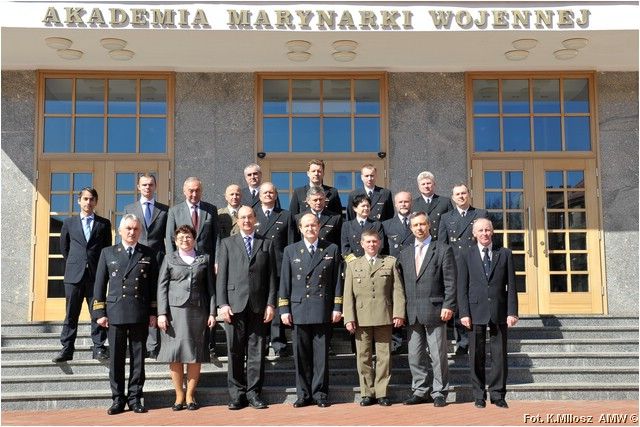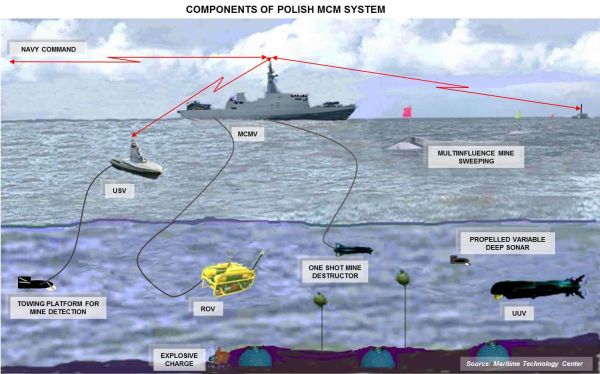By Dr Michał WIERCIŃSKI - UMS Management Committee member. Science and Military Education Department. PL MoD.
The European Defence Agency Unmanned Maritime Systems Cat. A programme (UMS) is an opportunity for developing technologies for the XXI century mine counter measures (MCM) and other naval applications. Moreover, it represents a unique opportunity to provide the Polish Navy with modern military equipment increasing its operational capabilities in 2020 perspective.
The UMS related technologies should enable the Polish Navy to conduct more efficient MCM operations in the future. Bearing this in mind, the Polish Minister of National Defence signed the relevant Programme Arrangement during the EDA Steering Board meeting held in Brussels on 9 December 2010. His signature, along with the signatures of 10 other defence ministers will allow specific UMS projects to be initiated in 2011.
Poland’s decision to join the UMS was a consequence of a detailed analysis among different institutions in the Ministry of National Defence (MoND). Furthermore, the Polish participation required the approval of the Navy Command, which supported the decision since the scope of the UMS programme is fully in line with the Polish Armed Forces Development Plan for the years 2009-2018, as far as MCM issues are concerned. This document reflects all operational needs of the Polish Armed Forces and is treated as one of the main guidelines in terms of R&T investment. It is also worth mentioning that the Polish Navy Command pays a special attention to the UMS results. By delegating representatives to manage three UMS projects, the Command hopes to fully harmonize their outputs with the Polish Navy’s operational needs.

According to Polish R&T Director Col. Józef Wrona the above mentioned aspect of harmonization is a key element as far as R&T is concerned. This opinion was presented during an opening ceremony of the UMS programme that took place in Gdynia on 19 April 2011. During this meeting, the Navy representatives had for the first time an opportunity to talk to the scientists and deeply discuss the UMS-led issues. Col Wrona also reminded that there still exists a necessity for developing an efficient mechanism that will enable the identification of technologies for which development is required from the capabilities’ perspective. He also stressed the importance of the end-user’s participation in the whole MCM capability development process. This involvement should start from an identification of the capability gaps, followed by research and development to address them, and ending with a capability delivery. Polish involvement in the UMS programme therefore, fully reflects this approach.
Poland decided to join five UMS projects with a total investment of 2,83 M€. The Naval Academy will perform some tasks within the “Signature Response Analysis of Multi-influence Mines” project that should improve knowledge on the ships signature response. Another Polish contractor - Maritime Technology Centre - will be involved in the projects of “Buried Mines” and “Modular Light-weight minesweeping”. The first one is expected to fill up technological gaps in buried mines detection and neutralization. The second will develop technologies for lightweight sweep sources that could be used in future unmanned surface vehicle platforms. Moreover, bearing in mind standardization and integration of different UMS projects it was fully recommended to engage in the “Systems Integration” and the “Standards and Interfaces” projects. Both Polish sub-contractors are participating in these projects.
The results of the UMS will represent an added value to national R&T efforts that will be conducted within National Research and Development Centre (NRDC) - the main national entity responsible for applied research and development programmes. In a couple of months a national strategic programme will be established focusing on development of different technologies and components. Its aim will be to enable the building of the XXI century MCM system based on national unmanned surface vehicles and unmanned underwater vehicles. Polish participation in the UMS programme is an important element providing the national programme with common European standards and necessary interfaces among different UMS-led technologies. Moreover, the UMS programme is also treated as an integrated element of a national armaments programme that is expected to provide the Polish Navy with a next-generation mine-countermeasures vessel (MCMV). The UMS technologies are therefore, the ones that potentially could be used by the MCMV to increase its operational capabilities.

From the Polish point of view, the development of MCM capability requires a comprehensive approach. While, national efforts are the core element of MCM technology development, the involvement in the international cooperation under the EDA framework is also essential. This cooperation will provide with the common standards so important as long as building a European MCM capability is concerned.